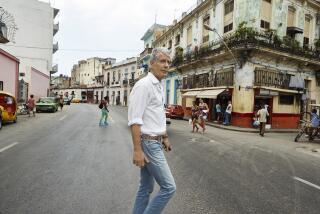Curried Dickens : SUCH A LONG JOURNEY <i> By Rohinton Mistry (Alfred A. Knopf: $22; 339 pp.)</i>
Could Charles Dickens write today and not be Tom Wolfe? If you think that the author of “Bonfire of the Vanities” is a latter-day Dickens, of course, the question doesn’t stand. If you think that he has a clever feel for present-day social ironies and little for the humans who inhabit them, clothes and manners apart, then it does stand.
The answer is no; not in our time and our place. On the other hand, it may be yes, elsewhere; in parts of what we call the Third World. A dramatic (perhaps stagy), heart-rending (perhaps sentimental), rich-hued (perhaps showy) realism seems to work when history lets it legitimately express the aroused, churning individual--clearly and roundly seen--tumbled up with an aroused, churning society--also clearly and roundly seen.
It works with “Such a Long Journey” by the Indian writer Rohinton Mistry. Its account of a middle-class Parsi family in Bombay, struggling to maintain its hope and values in a rising tide of poverty and corruption, is authentically Dickensian. It can be garish and contrived, and indulgent and self-indulgent in the marshaling of its story, but its major characters and some of its minor ones are unforgettable and deeply and broadly moving. That is, as they individually move us, their world moves and cracks around them.
One of the major characters is an apartment house. The Khodadad Building lies around a courtyard; respectable but not lavish when it was put up; decaying now, though still struggling to be respectable. A cinder-block wall sets it off from the human swamp of the streets, but the set-off is illusory. Passersby relieve themselves against it; the stench and the mosquitoes seep into the unscreened windows above.
The Khodadad residents--the police inspector who cycles to and from work; an old man who leans from his window to argue with God over the local and national news; Tehmul, a brain-damaged young man who sees himself as the building’s watcher and news-bearer; Miss Kutpitia, who has the only telephone--are a panoramic background. They are picturesque, comic, touching, but they are not random vignettes. Rohinton uses them as a context for his story of India versus Gustad Noble and his family.
Gustad is noble, in fact, and terribly plagued. Son of a prosperous bookseller, his memories are of culture and dignity, if not wealth. His present is all indignity and struggle. A bank clerk, poorly paid, he is cramped into his Khodadad apartment with his wife Dilnavaz, his half-grown sons, Sohrab and Darius, and his little daughter Roshan.
Home is tenderness, fury and a continual struggle, not just to get by but to get by with a spark of hope and pleasure. At the start, Gustad has brought home a live chicken. Feed it for two days, have it slaughtered, and it will taste like chickens used to taste and not like the store-bought frozen ones. So he tells his protesting wife. She has been up since 5 a.m. collecting water in tubs because it is shut off most of the day. She has been haggling with the milk-seller over his wretchedly watered milk. She struggles all day with dirt and bugs and stench.
The chicken is fed and killed--Roshan is in tears, having fallen in love with it--and served at dinner to Dinshawji, their friend and Gustad’s fellow bank clerk. But it never gets eaten. There is a terrible quarrel beforehand between Gustad and Sohrab, his eldest, and nobody has any appetite.
Gustad wants Sohrab to go to the technical college, for which he has qualified. Sohrab refuses; he wants to stay with his friends and study liberal arts. Gustad has been all over town collecting scholarship applications. Sohrab throws them away. Dilnavaz retrieves them.
Sohrab is Gustad’s hope that the future will have some of the same luster as he remembers from the past. He can accept present drudgery and hardship if it will bridge the two, just as he accepted being crippled after a street car hit him while he was rescuing Sohrab--then a baby--who had fallen onto the tracks.
If Sohrab is Gustad’s beacon--and his despair when it flickers--another is his friendship with Maj. Jimmy Bilimoria. “Major Uncle” was a hero from the early days of independence and virtually a godfather to the entire family. The hope he represented was not personal so much as national. Major Uncle stood for the dream of what India might be. When he disappeared without a farewell, mortally offending Gustad, the injury abated when word trickled out that he had joined the country’s intelligence service. Surely he was fighting nobly against the Pakistanis in what was to become Bangladesh.
So, when Gustad receives a message from Major Uncle telling him secretly--and illegally--to deposit a huge amount of money, bit by bit, in his bank, he accepts it as a patriotic mission and enlists his friend Dinshawji to help him.
It turns out to be a corrupt swindle. The money is appropriated for the personal use of Prime Minister Indira Gandhi and her family. Major Uncle is part-victim, part-accomplice. Gustad and Dinshawji are victims, not so much materially--they manage to extricate themselves, though Dinshawji dies from cancer and stress--as in their beliefs.
It is a melancholy story of betrayed hope--personal and national--and sometimes, in its twists and turns, it is a forced and melodramatic one. The strength of Mistry’s novel is not in its big story but in its many small ones. It is in the daily struggles, victories and defeats of Gustad, his family and his friends.
Above all, it is in the vividness of the characters and of their lives. There is Dilnavaz, loving and skeptical, supremely rational in the face of Gustad’s flights, yet capable of trying out a whole set of spells to restore peace in the family.
There is the instructor in the spells, the prim and reserved Miss Kutpitia, upstairs. With a little extra money, she does good in strictly measured doses, and refuses to lament her great past grief: the death of a cherished nephew. “Tears have all been cried long ago, not one drop remaining,” she says, dragging her eyelids down with her forefingers. “See, totally dry.”
There is the grotesque yet human Tehmul. He falls in love with Roshan’s doll, steals it and has sex with it; but Mistry lets us see this as pure yearning as well as deformity. There is Sohrab, stiff-necked and rebellious, yet full of love for his father. There is Dinshawji, who conceals his fatal cancer and sadness with ebullient clowning. It is a kind of nobility. “Let me tell you it’s more difficult to be a jovial person all the time than to be a quiet sickly one,” he tells Gustad not long before he dies.
Finally, of course, there is Gustad; choleric, undaunted, battling despair and consumed with tenderness. Mistry has made a memorable character, and has allowed him one shining victory.
Gustad notices a pavement artist whose specialty is religious pictures. He persuades him to come to the Khodadad and decorate its wall with 300 feet of images of Hindu and Christian deities and saints. Not only do the passersby desist from using it as a latrine, out of respect, but some of them attach flowers and incense to it. Instead of reeking, the wall perfumes. It is comic and joyful.
And when the city bulldozes the wall--all miracles are frail in Bombay--the author gives a last word to the artist. Picking up his crayons, he prepares to move on. Where will he go, asks the dejected Gustad?
“Where does not matter, sir. In a world where roadside latrines become temples and shrines, and temples and shrines become dust and ruin, does it matter where?”
More to Read
Sign up for our Book Club newsletter
Get the latest news, events and more from the Los Angeles Times Book Club, and help us get L.A. reading and talking.
You may occasionally receive promotional content from the Los Angeles Times.






